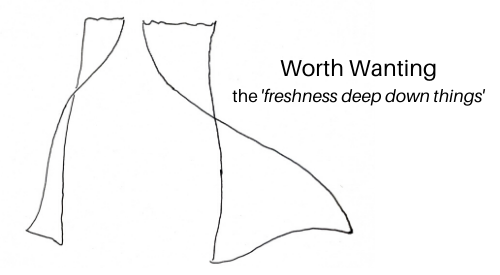
The question: how do our encounters have fresh-future-forever? If we are ‘generously invited’ to share freshness’ eternal livingness’, how do our encounters in their particularity partake of what’s offered? Each encounter is an act of creation, some new and good thing called into existence, not an abstraction but a concrete occasion. Its particularity is an important part of what it is, its identity grounded in the mundane and so shaped and localized by constraints of space, time and number. If an encounter has a future, and constraints such as these don’t apply, the encounter and its participant creators will lose their particularity, becoming less and less distinct and specific, gradually blending with all other encounters and encounterers in something like a featureless fluid.
And yet a key claim about encounters is that they last, that they not dissolve into generic value, but that they each retain their uniqueness, as do we as participants. And why not? If the world to come is a ‘new and lively cosmos of infinite hospitality, friendship and exploration’, there must be interaction between particulars.
And yet the transcendent is constrained only by considerations of frexhos (friendship, exploration and hospitality), not by nust (number, space and time). Can we imagine little bubbles of materiality in the transcendent providing the constraints that encounters need to retain their particularity? A new bubble for each encounter? A network? A whole new mundanity within the transcendent? This, the world to come?
What this does is blur the distinction between the mundane and the transcendent that is so important to maintain.
The constraints of time, space and number are inherent in the materiality of the world, but not all constraints are material. Some are legal, some are social. Some are more or less mandatory, and more or less subject to our assent, and these can shape our behaviors profoundly as nust criteria do.
So, here’s my thought: What if encounters in the transcendent are invited to voluntarily submit to some other set of constraints, not nust, which demand the kind of continuing choices which maintain a kind of shape and locality, that is a unique particularity. Any assent by an encounter has to involve concurrence by its individual participants. With this consent, each encounter then would agree to go on being a something, not an everything, nor an anything in the encounter-fest of the world-to-come.
If we can characterize the world-to-come as a courtship, a wooing, of particularity by potentiality, then the commitment of encounters to practice continued particularity, is fundamental to the relationship. It gives freshness something specific to love–individual encounterers, individual encounters, and the world web of encounters as a whole–who spontaneously and whole-heartedly reciprocate.
Since in today’s hyperconnected world, contour and locality are less and less distinctly enforced by nust constraints, we already craft sets of personal and social constraints to confirm (and protect) our sense of unique identity. So too, in the transcendent, we may choose to adopt constraints which have the effect not of preserving an unchanging identity forever, but of providing what identity can get traction on to grow.
All his suggests that in the ‘new and lively cosmos’ to come, there will be several sets of constraints, one related to particularity (similar in function but not the same as nust), another related to potentiality (frexhos), and lastly, an voluntary assent to both.
When, existing as we do now in the mundane, we accept invitation to encounter, we assent to frexhos. When, existing as we will then in the transcendent, we accept the invitation to the great party of the progressive consummation of creation, we assent to constraints of particularity. This is a ‘yes, yes I will, yes’, such as burns at the heart of all love that we love. The assent to what makes our particularity possible is an agreement to be loved.
Assent is not mandatory; there is an opt-out. If we think of encounters as viable seeds, an encounter opting out of assent to an affirmation of its particularity may be like a seed with a thick coat that needs time or some special treatment to be ready to germinate, if it does at all.
How the livingness of potentiality of freshness, and the livingnesses of particularity of each of us which come together in encounters play out their fresh future forever is what makes our lives and what’s after our lives worth looking forward to.
